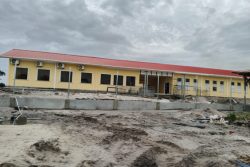Dear Editor,
I read Narissa Deokarran’s letter complaining about severe pollution fumes (‘NDC will not deal with health hazard of air pollution’ SN, Nov 30) and saw your follow-up report in ‘Lusignan resident seeking relief from neighbour’s fireside fumes’ (SN, Dec 2).
The sharing of air space and quality is as fundamental a right as we can get since we drew our first breath at birth. Smoke is an utterly odious invasion of our sanctuary and freedom to function, a life-choking torture. Exposure is tolerated, but must be brief, infrequent and distant.
In this age of information the toxins in smoke are well known and documented. Among them the colourless and odourless carbon monoxide (CO) gas produced has 250 times the affinity of oxygen for haemoglobin in the blood, but unlike oxygen, which is carried from there to the rest of the body and released where needed, the CO holds on to the haemoglobin and prevents it from collecting oxygen in the lungs. (See, eg, https://en.wikipedia.org/wiki/Hemoglobin, which I certify to be accurate.)
So the Deputy Regional Chairman of Region 4 should not have to say they need “scientific evidence” to carry out their responsibility for the well-being of citizens. And the particles, whether the black soot or the more toxic white alkali oxides, make it eminently visible, so there is no excuse for inaction. The onus for legal action should not be on the sufferer of such evident pollution, but on the perpetrator after enforcement of the anti-pollution laws.
I would advise the sufferer of such pollution and the NDC to study Cap 20:05 of the Laws of Guyana, subsection 27 (1)(b) et seq, and get the agency who is supposed to know the science to address the issue. When a prohibition notice is issued the perpetrator must cease. If the perpetrator appeals, the prohibition stands until the appeal allows continuation.
Yours faithfully,
Alfred Bhulai








